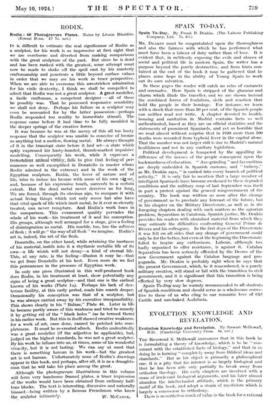SPAIN TO-DAY.
Ma. DEAKIN must be congratulated upon the thoroughness and also the fairness with which he has performed what must have been a labour of duty rather than of love. It is evident that, in ruthlessly exposing the evils and abuses of social and political life in modern Spain, the writer has a purpose beyond the purely destructive, and from hints con- tained at the end of the book it may be gathered that he places some hope in the ability of Young Spain to work out its own salvation.
In these pages the reader will catch no echo of castanets and serenades. Here Spain is stripped of the glamour and charm which illude the traveller, and we are shown instead the combined forces of feudalism, sloth and reaction that hold the people in their bondage. For instance, we learn with a shock that more than 50 per cent. of the Spanish people can neither read nor write. A chapter devoted to health, housing and sanitation in Madrid contains facts so well authenticated, based as they are on official statistics and the statements of prominent Spaniards, and yet so horrible that we read almost without surprise that in 1920 more than 500 deaths were recorded from typhoid fever in the capital alone. That the number was not larger still is due to Madrid's natural healthiness and not to any sanitary legislation.
Political development is hampered by the appalling in- difference of the masses of the people consequent upon the backwardness of education. " Axe-grinding " and favouritism are deeply embedded in Spanish customs, and " bribery," as Mr. Deakin says, " is carried into every-branch of political activity." It is only' fair to mention that- a large number of intelligent Spaniards have become awakened to these degraded conditions and the military coup of last September was itself in part a protest against the general misgovernment of the country. The book was written so soon after the change of government as to preclude any forecast of the future, but in his chapter on the Military Directorate, as well as in the foregoing chapters dealing with such matters as the agrarian problem, Separatism in Catalonia, Spanish justice, Mr. Deakin provides his readers with abundant material from which they may estimate the difficulties confronting General Primo de Rivera and his colleagues. In the first days of the Directorate it was felt on all sides that any change of government could only be for the better, but even at the beginning the Directorate failed to inspire any enthusiasm. Labour, although too badly organized to offer resistance, is against it. Catalan Separatism has been seriously offended by the Decree of the new Government against the Catalan language and pro- paganda. Mr. Deakin is probably right when he says that the present Government, which, be it remembered, is a purely military creation, will stand or fall with the transition to civil government, and it is significant that this transition is being effected by very slow degrees.
Spain To-Day may be warmly recommended to all students of Spanish conditions and should serve as a wholesome correc- tive to those of us who cling to our romantic love of Old Castile and sun-baked Andalusia.






































 Previous page
Previous page